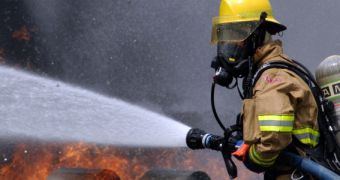Researchers with the Mount Sinai School of Medicine have determined in a new study that firefighters and other emergency personnel that fought the flames and smokes on September 11, 2001 in New York are very likely to develop post-traumatic stress disorder (PTSD) and a condition called sleep apnea.
Both of these disorders can adversely influence cardiovascular health, the team explains, which is why at-risk populations need to be monitored and studied in depth. These conclusions were recently presented in two separate papers, showcased at a conference organized by the American Heart Association (AHA).
The investigation was led by scientists with the Icahn School of Medicine at Mount Sinai. The work determined that the inhalation of particulate matter released as the World Trade Center buildings collapsed on 9/11 is the primary driver of PTSD and sleep apnea in emergency response personnel.
PTSD is a condition characterized by high levels of anxiety, the tendency of avoid or numb memories related to traumatic events, and by recurring flashbacks that disturb the patient and decrease their quality of life. A clinical diagnostic for this disorder can be placed when these symptoms do not subside more than a month after the initial exposure to the traumatic stimuli.
“Our study shows high exposure to the massive dust cloud of air pollution at Ground Zero has increased the risk among first responders of both obstructive sleep apnea and PTSD,” says researcher Mary Ann McLaughlin, MD, MPH, who is a cardiologist at Mount Sinai. She is also the principal investigator for the WTC-CHEST program at the School of Medicine.
“As a result, this puts our 9/11 first responders at higher risk of developing heart disease,” she goes on to say. Experts believe that the particulate matter released over New York City on 9/11 contained everything from cement and dust particles to smoke, heavy metals and glass fibers. The personnel that intervened were exposed to these harmful substances and compounds right away.
“Elevated exposure to the particulate matter from 9/11 caused upper airway inflammation and is a significant contributing factor to the pathogenesis of obstructive sleep apnea. There is strong evidence in our study data showing a significant risk of inhaled particulate matter exposure and risk of obstructed sleep apnea in the studied group of WTC first responders,” the investigator adds.
Sleep apnea is a dangerous condition that involves the collapse of the upper respiratory pathways in patients, when they sleep. Shallow or infrequent breathing also accompanies this disorder, and some people can even stop breathing altogether, sometimes for dozens of seconds.
“High levels of exposure to particulate matter may lead to sleep apnea and PTSD, and as a result a high risk factor for cardiovascular disease. As a result of our new study findings, we plan to further closely monitor our WTC first responders for heart disease warning signs,” McLaughlin concludes, quoted by PsychCentral.

 14 DAY TRIAL //
14 DAY TRIAL //